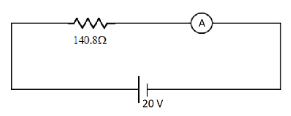Question
Question: The ammeter shown in the figure consists of a \( 480\Omega \) coil connected in parallel to a \( 20\...
The ammeter shown in the figure consists of a 480Ω coil connected in parallel to a 20Ω shunt. The ammeter is then connected to a 140.8Ω resistance and a 20V battery. The reading of ammeter is

(A) 0.125A
(B) 1.67A
(C) 0.13A
(D) 0.67A
Solution
We are given that two resistances are places in parallel where the 20Ω resistance is a shunt. So then we can calculate the total resistance in the circuit connected with the ammeter and the equivalent resistance will be that in series with 140.8Ω . Now since the emf of the battery is given 20V , using that we can find the total current in the circuit having the equivalent resistance. This total current is the reading shown by the ammeter.
Formula used: In this question, we will be using the following formula,
Req=R1+R2+R3+.... where Req is the equivalent resistance when the resistances are placed in series.
Req1=R11+R21+R31+.... where Req is the equivalent resistance when the resistances are placed in a parallel circuit and, I=RV where I is the current in the circuit and V is the emf of the call placed in the circuit.
Complete step by step solution:
We are given that the ammeter given in the figure consists of a coil and a shunt resistance. So the ammeter looks like this,

So the resistances 20Ω and 480Ω connected across the ammeter are in parallel, so the total resistance can be found out from the formula,
Req1=R11+R21+R31+....
Now here we can put, R1=20Ω and R2=480Ω . Therefore we get,
Req11=201+4801
Now taking LCM in the denominator, we get
Req11=48024+1
So by taking the reciprocal we get,
Req1=25480
The equivalent resistance is, Req1=19.2Ω
Therefore in the complete circuit, the resistance 140.8Ω is placed in series with the equivalent resistance across the ammeter.
so, to find the equivalent resistance we use the formula,
Req=R1+R2+R3+....
Where the values R1=140.8Ω and R2=19.2Ω
Therefore we get the equivalent resistance as,
Req=140.8+19.2
Adding we get the resistance,
Req=160Ω
Now in the given circuit, the emf of the cell is provided as, 20V . So the current in the circuit can be found out from the Ohm’s law as,
I=RV
Substituting the values we get,
I=16020A
By doing the division we get,
I=0.125A
Therefore, the reading given by the ammeter will be, 0.125A
Therefore, the correct option is option (A) 0.125A.
Note:
The shunt resistance in the question that is connected in parallel to the ammeter is a low resistance path that is provided to the. It is always connected in parallel to the ammeter and sometimes it is built inside the instrument while the other times it is connected externally outside the circuit.
